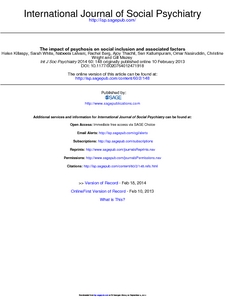Killaspy, H; White, S; Lalvani, N; Berg, R; Thachil, A; Kallumpuram, S; Nasiruddin, O; Wright, C; Mezey, G
(2014)
The impact of psychosis on social inclusion and associated factors.
INTERNATIONAL JOURNAL OF SOCIAL PSYCHIATRY, 60 (2).
148 - 154.
ISSN 0020-7640
https://doi.org/10.1177/0020764012471918
SGUL Authors: Mezey, Gillian Clare White, Sarah Jane Wright, Christine Thachil, Ajoy Francis
![[img]](https://openaccess.sgul.ac.uk/107164/1.hassmallThumbnailVersion/Int%20J%20Soc%20Psychiatry-2014-Killaspy-148-54.pdf)  Preview |
|
["document_typename_cannot open `/data/SGUL/sgul/eprints3/archives/sgul/documents/disk0/00/10/71/64/01/Int' (No such file or directory)
cannot open `J' (No such file or directory)
cannot open `Soc' (No such file or directory)
cannot open `Psychiatry-2014-Killaspy-148-54.pdf'" not defined]
Published Version
Available under License St George's repository terms & conditions.
Download (737kB)
| Preview
|
Abstract
Background: People with mental health problems are known to be socially excluded but the contribution of pre-morbid characteristics, symptoms and needs, and the impact on quality of life is unknown.
Aims: To investigate change in social inclusion after the development of a psychotic Illness and factors associated with this.
Methods: A cross-sectional community survey of people with psychosis was carried out in three areas of London. Five domains of social inclusion (social integration, consumption, access to services, productivity, political engagement) were assessed prior to the onset of illness and currently using the Social Inclusion Questionnaire User Experience. Quality of life, symptoms and needs were also assessed using standardized measures. Factors associated with change in social inclusion were investigated using multiple regression.
Results: Productivity and social integration among the 67 participants reduced after the onset of psychosis. Older age at onset and longer duration of illness were associated with greater reduction in productivity. Less reduction in social integration was associated with greater quality of life. Participants reported barriers to social inclusion that were directly related to symptoms of their illness, low confidence and poor self-esteem.
Conclusions: A greater focus on interventions that can facilitate the occupation and the social networks of people with psychosis is required. Interventions that tackle ‘self-stigma’ may also prove useful in mitigating the social exclusion experienced by people with psychosis.
| Item Type: |
Article
|
| Additional Information: |
© The Author(s) 2013. This article is distributed under the terms of the Creative Commons Attribution-NonCommercial 3.0 License (http://www.creativecommons.org/licenses/by-nc/3.0/) which permits non-commercial use, reproduction and distribution of the work without further permission provided the original work is attributed as specified on the SAGE and Open Access page(http://www.uk.sagepub.com/aboutus/openaccess.htm). |
| Keywords: |
Psychosis, social inclusion, Science & Technology, Life Sciences & Biomedicine, Psychiatry, PSYCHIATRY, SSCI, Psychosis, social inclusion, MENTAL-HEALTH-CARE, PEOPLE, SCHIZOPHRENIA, EXCLUSION, INDEX, Psychiatry, 1103 Clinical Sciences, 1701 Psychology |
| SGUL Research Institute / Research Centre: |
Academic Structure > Population Health Research Institute (INPH) |
| Journal or Publication Title: |
INTERNATIONAL JOURNAL OF SOCIAL PSYCHIATRY |
| ISSN: |
0020-7640 |
| Related URLs: |
|
| Dates: |
| Date | Event |
|---|
| 1 March 2014 | Published |
|
| Web of Science ID: |
WOS:000331433900006 |
| URI: |
https://openaccess.sgul.ac.uk/id/eprint/107164 |
| Publisher's version: |
https://doi.org/10.1177/0020764012471918 |
Statistics
Item downloaded times since 16 Sep 2014.
Actions (login required)
 |
Edit Item |


